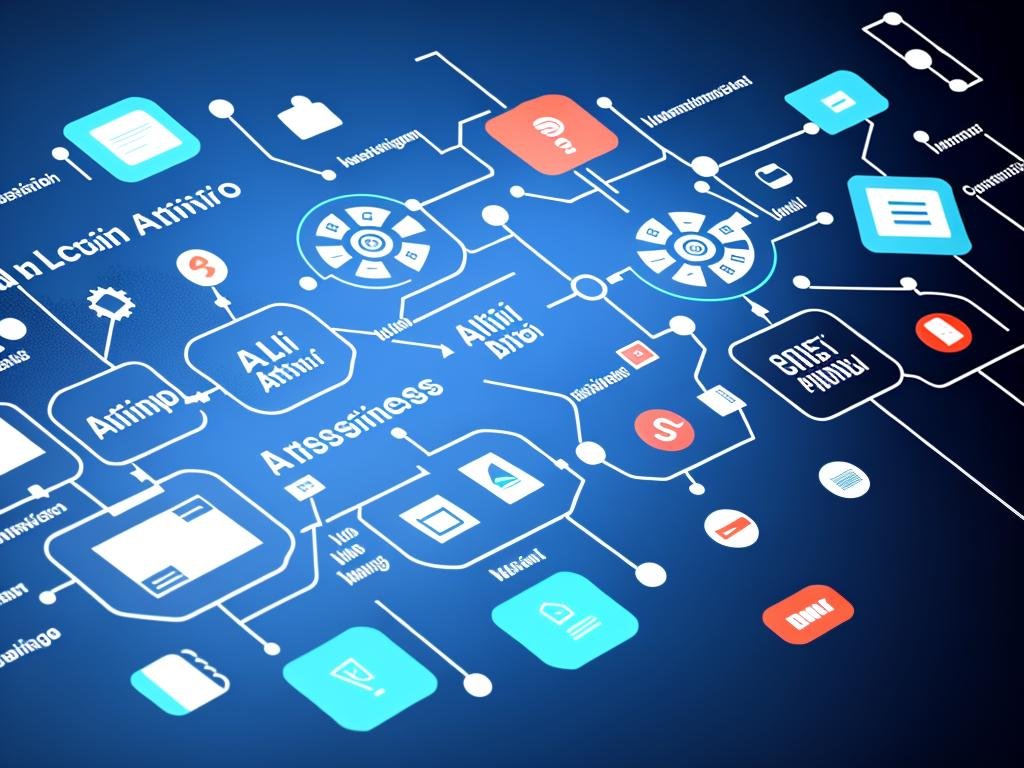In today’s fast-paced world where technology is the driving force, Artificial Intelligence (AI) is making substantial impact across various industries by boosting efficiency, enhancing productivity, and revolutionizing the way businesses operate. The purpose of this discourse is not just to demystify AI – breaking down its types, functionalities, benefits, challenges, and terminologies, but also to acknowledge its influential role in the business landscape. It takes a comprehensive look at how AI has penetrated and transformed different areas such as sales, customer service, HR, manufacturing, and marketing. Moreover, it provides detailed case studies from several sectors that threw light upon the problems, AI-based solutions, and the benefits achieved, serving as a realistic grasp of AI’s influence on businesses. To round off, it gazes into the future trends of AI and their potential impact, offering insights to equip businesses to stay ahead in this competitive scenario.
Understanding Artificial Intelligence (AI)
Understanding Artificial Intelligence (AI)
Artificial Intelligence, more commonly known as AI, is essentially a branch of computer science that focuses on the development of machines and software that can perform tasks requiring human intelligence. These tasks entail complex capabilities like understanding human language, recognizing patterns, learning, planning, and problem-solving.
The concept of AI dates back to the mid-20th century when computer science began emerging as a field. British mathematician and logician Alan Turing, considered by many to be the father of computer science and artificial intelligence, provided a conceptual foundation and a test -the Turing Test- for determining if a machine exhibits intelligent behaviour.
AI essentially works by combining large amounts of data with iterative, fast processing and intelligent algorithms. This allows the software to learn from the patterns and features in the data progressively.
Types of AI
The realm of AI is often segmented into two types: weak AI and strong AI.
Weak AI, also known as Narrow AI, is a system designed and trained to do specific tasks such as voice recognition. Virtual personal assistants like Amazon’s Alexa or Apple’s Siri are examples of this form of AI.
On the other hand, strong AI, also called Artificial General Intelligence (AGI), is an AI system with generalized cognitive abilities. Here, the system can understand, learn, adapt, and implement solutions indifferent of the tasks. It’s intellectually at par with a human mind. However, we are yet to fully achieve this level of AI.
Capabilities, Benefits, and Challenges
AI significantly contributes to enhancing efficiency and effectiveness in a business context. By eliminating human error, businesses can provide higher service quality, resulting in improved consumer satisfaction. The automated processes provided by AI tools also allow for cost reduction and increased productivity.
On the downside, as AI replaces manual intervention, job losses for certain roles are inevitable. The lack of human touch can also lead to issues relating to impersonality or misunderstanding context during interactions.
Moreover, another significant challenge is data privacy and security concerns. AI systems collect vast volumes of data, potentially incorporating personal and sensitive information. This brings about the challenge of safeguarding data privacy and dealing with potential breaches.
Terminology in AI Business Context
Machine Learning (ML) is a significant term related to AI, describing the scientific study of algorithms and statistical models that machines use to carry out tasks without explicit instruction.
Neural Networks are computing systems providing the foundation upon which most modern AI works. These networks are designed to mirror the human brain’s ability to recognize patterns and learn from it.
Natural Language Processing (NLP) is another subfield of AI that focuses on the interactions between computers and human language. This field enables machines to understand and derive meaning from human languages.
In Summary
Getting a handle on Artificial Intelligence (AI) can be a complex task. However, mastering the basic knowledge of its core components is a necessity, given its growing impact on various businesses.

AI in Business: An Overview
Insight into AI Applications in Business
Artificial Intelligence is increasingly conspicuous across diverse business sectors. It utilizes superior algorithms and predictive analytics to assist companies with data mining, automation of operational processes, customer service and evidence-based decision making.
Success Stories of AI Integration
Numerous stories herald the transformational impact of AI in different businesses. Amazon, for example, has reaped generous benefits by leveraging AI for personalized recommendations. Their recommendation engine, powered by machine learning, analyzes customer purchase history, items in the shopping cart, items rated and liked, and what other customers are purchasing. It improves customers’ shopping experiences, drives more sales, and increases customer loyalty.
Netflix is another company that has embraced AI technology. Utilizing machine learning, they recommend shows and movies based on viewers’ preferences, significantly enhancing user experiences and increasing viewership.
Moreover, Google uses AI in its search engine through an algorithm called RankBrain. This AI system interprets the searches and presents the user with the most relevant information, even if the exact words are not in the search query.
Changes Brought by AI
AI has introduced significant changes across the business landscape. One of the most noticeable shifts is in the realm of customer service. Bots and virtual assistants have opened up new avenues for companies to interact with their customers, offering 24/7 support, faster response times, and personalized interactions.
In the production and manufacturing sectors, AI has enabled predictive maintenance—predicting failures before they occur—which significantly reduces downtime and repair costs. Similarly, AI has also been a game-changer in supply chain management, allowing companies to foresee market demands in real-time and improve inventory management.
An Overview of AI’s Emerging Applications in Business
AI has experienced significant adoption across global businesses, reshaping a multitude of industries. A McKinsey survey reveals that nearly half of the companies surveyed already utilize AI in at least one of their business divisions. Further, according to the International Data Corporation (IDC), the expenditure on AI and cognitive systems may reach USD 77.6 billion by 2022, marking a 37.3% growth from 2018.
The retail sector currently leads in AI investment, followed closely by banking and discrete manufacturing sectors. From a geographical perspective, the United States is anticipated to deliver over 65% of the total AI spending globally, with Western Europe and China trailing behind.
These impressive figures underscore AI’s significance not merely as an advantageous tool, but as an indispensable catalyst toward success in today’s digitally-focused business climate. Regardless of sector, the potential of AI to transform business operations and foster growth and innovation is becoming increasingly evident.

Deep-Dive into Business Processes Enhanced by AI
Revitalizing Sales through AI
Sales departments have witnessed a paradigm shift, thanks to the incorporation of AI in their operations. The advent of AI-enabled Customer Relationship Management (CRM) systems, for example, have made tracking and managing customer interactions more intuitive, efficient, and instantaneous. Moreover, these systems provide predictive analytics, offering foresight into sales trends and customer behaviors. Tools such as Salesforce’s integrated Einstein AI assist sales teams by using past data to automatically score leads, aiding in prioritizing prospects.
In addition to boosting the effectiveness of sales activities, AI’s predictive capabilities also play a significant role in customer retention. It can raise critical alerts about potential customer attrition, allowing businesses to implement timely interventions. IBM Watson, a pioneer in AI technology, provides tools that analyze customer sentiment during interactions, predict potential churn and enable preventative measures, all contributing to an improved overall customer experience.
AI in Customer Service: Upping the Ante
In the customer service arena, AI has played a transformative role in heightening process efficiency through automation and predictive analysis. AI-driven chatbots, like Drift and Ada, have redefined customer interactions by facilitating 24×7 customer support services, acting as first-level support to handle generic queries. These chatbots, trained using Natural Language Processing (NLP), can comprehend and respond in human language, providing a more personalized response.
Furthermore, AI tools like Zendesk’s Satisfaction Prediction use machine learning to signal customer satisfaction levels, enabling service teams to preemptively address issues that could negatively impact customer relationships.
AI in Human Resources: Streamlining Operations
From streamlining the recruitment process to creating personalized employee experiences, AI’s role in human resources is multifaceted. Applicant tracking systems (ATS) powered by AI, such as Workable and Greenhouse, have simplified the recruitment processes by automating resume screening and shortlisting candidates based on predefined criteria.
AI-enabled tools like Ultimate Software’s UltiPro Perception use sentiment analysis to gauge employee sentiments from surveys, focus groups, and one-on-ones, enabling HR professionals to get insights into employee engagement, job satisfaction, and areas of improvement.
AI in Manufacturing: Driving Efficiency and Innovation
AI has enormous implications for the manufacturing sector. It allows companies to increase productivity, optimize operations, enhance quality control, and maintain machinery more effectively. GE’s Predix platform, for instance, employs AI to predict maintenance needs of machines, reducing down-time, and improving efficiency.
AI-powered industrial robots like FANUC are not only automating redundant tasks but also learning and improving over time. Additionally, AI-powered supply chain management tools, like IBM Watson Supply Chain, provide insights to optimize inventory management, reduce costs, and reduce lead time.
AI in Marketing: Reimagining Engagement
Marketing has been revolutionized by AI’s ability to analyze vast amounts of data for extracting customer insights, personalizing interactions, and predicting trends. Tools like Marketo use predictive analytics to identify potential customers and target them more accurately.
AI-enabled marketing automation platforms, like HubSpot, enable personalized customer messaging and content, enhancing engagement, and conversion rates. AI has also powered advancements in content creation, with tools like Phrasee, that can generate human-sounding, brand-compliant textual content.
AI’s revolutionary prowess is being explored in different business capabilities today, enhancing operational proficiency, decision-making skills, and boosting a business’s overall competitive edge. The ongoing evolution of AI tools and applications, powered by continued developments in machine learning and natural language processing, holds out the promise of future revolutions, potentially limitless in their reach and effects.

Case Studies: Successful AI Implementations
Case Study 1: AI in Healthcare: IBM Watson
The American healthcare sector is grappling with a myriad of problems, including the escalating cost of health services coupled with growing demands for improved results. IBM Watson, an AI-driven platform, has taken on the challenge, using its advanced analytics, automation, and machine learning capabilities to achieve more efficient use of resources and enhance patient care.
IBM Watson’s AI-powered suite comprises several applications to handle diverse healthcare operations. One of these, Watson for Oncology, helps physicians identify bespoke, evidence-based treatment options for cancer patients. The AI tool uses natural language processing to analyse structured and unstructured data derived from medical literature, clinical guidelines, and individual patient records.
Utilizing Watson has led to benefits such as accurate diagnosis and personalized treatment planning, which potentially improves patient outcomes. Overall, IBM Watson’s AI solution shows substantial promise for tackling the inefficiencies plaguing the healthcare industry.
Case Study 2: AI in Retail: Amazon
One of the most prominent real-world examples of AI implementation in retail is Amazon. With increasing competition and changing customer expectations, Amazon needed a solution to stay ahead.
The AI-assisted solution developed by Amazon is its recommendation system. This system uses machine learning algorithms to predict what customers might want to buy based on their browsing history, purchase history, and other data. This improves product discovery for customers and helps Amazon increase its upselling and cross-selling opportunities.
Such a strategy has brought tremendous benefits to Amazon as it helps drive sales. According to a McKinsey report, 35% of Amazon’s revenue is generated by its recommendation engine. This clearly demonstrates how AI can significantly affect a company’s bottom line.
Case Study 3: AI in Manufacturing: General Electric
General Electric (GE), a renowned manufacturing company, faced the challenge of optimizing its operations amid growing complexities in manufacturing processes. To resolve this, the company implemented AI solutions in the form of predictive analytics tools.
GE developed an AI-enabled platform called Predix. This platform uses AI to analyze data from machines and predict failures before they occur. The system can monitor machine health in real-time, allowing the company to implement preventive maintenance measures before any significant damage is done.
The implementation of this AI solution had profound benefits for GE. The predictive maintenance capability helped reduce downtime, improve operational efficiency, and subsequently, save costs. As quoted by GE, this solution can result in saving up to 12% over scheduled repairs, reducing overall maintenance costs, and improving machine efficiency by 25%.
Artificial Intelligence (AI) has become integral to the advancement of various industries, including healthcare, retail, and manufacturing. These case studies highlight the transformative power of AI, from enhanced efficiency and cost-effectiveness to elevated service quality. Given the wide spectrum of applications and their ensuing benefits, AI is undoubtedly a significant contributor to successful business operations.

Photo by blakewisz on Unsplash
The Future: AI Trends and Predicted Impact on Business
The AI Revolution: Glimpsing into Our Future
We are now living in the era of Artificial Intelligence (AI), wherein its influence in shaping market dynamics and consumer behaviors is as significant as the standard business operation itself. According to Gartner, AI augmentation is expected to help generate a business value of $2.9 trillion by 2021. The role of AI technologies includes increasing productivity, enhancing customer experience, and driving innovation in business models. This promising trend indicates more than just a revolutionary influence on commerce; it signals the dawn of an interconnected, AI-driven world.
Upcoming AI Technologies
AI technologies continue to evolve at a heightened pace, the implications of which reshape business. There are countless upcoming AI technologies, yet some stand out for their disruptive potential.
Deep Learning, a subset of Machine Learning, allows computers to learn from vast amounts of data. These self-learning algorithms mimic the human brain’s ability to recognize patterns and use them for decision-making. Deep learning is poised to have far-reaching implications within the business world, especially in sectors like Healthcare, where it can help in diagnosing diseases, and Retail for customer segmentation and personalization.
Natural Language Processing (NLP) is another technology expected to transform businesses. NLP enables machines to understand, interpret, and generate human language. It allows businesses to break down language barriers internationally and help elevate customer service channels with automated but personalized interactions.
While Robotics and cognitive automation currently take over mundane tasks for efficiency, future robots equipped with AI could take on complex tasks, think and learn like humans, and create substantial space for human employees to focus on higher-order tasks.
Noteworthy Trends in AI
AI’s penetration into businesses has begun and is set to grow at a faster pace. Several trends are key in highlighting the scale and impact of this change.
First, Big Data doesn’t seem so big anymore. With AI systems capable of sorting and analyzing vast data streams, businesses can make data-driven decisions rapidly which might have been impossible a decade ago.
Second, the Internet of Things (IoT) coupled with AI introduces limitless possibilities. Smart devices help businesses make real-time decisions, predict consumer behavior, and reduce operational costs.
Third, AI is poised to enhance customer experiences at unprecedented levels. Machine learning algorithms provide personalization, automated customer service takes care of basic inquiries and virtual shopping assistants guide customers through their buying journey.
Lastly, AI in supply chain management is expected to revolutionize the process, minimizing errors, reducing costs, and improving speed and quality.
AI’s Impact on Business & Strategy
The plethora of opportunities AI introduces is balanced by its disruptive implications in myriad workplaces. The most critical impact is reskilling. With AI taking over repetitive tasks, the workforce must pivot towards roles that require human judgment, empathy, and creativity.
On the strategic front, businesses must implement AI technology without compromising human involvement and ethical considerations. Privacy concerns and potential bias in AI algorithms are areas businesses need to navigate carefully.
How Can Businesses Prepare?
Keeping pace with AI’s rapid development is a constant challenge for businesses. Training programs must be put in place to improve the digital skills of the workforce.
Further, businesses must invest in collaborations with AI service providers or building in-house capabilities. An open-minded approach towards accepting AI’s potential in reshaping the business environment is crucial.
A long-term strategic planning can help businesses adapt to the evolving AI ecosystem. Also, investing in areas such as data management and infrastructure is critical to leverage the full potential of AI.
Lastly, creating an ethical framework around AI use is more critical than ever. Businesses must ensure transparency, fairness, and accountability in their AI systems to foster trust among stakeholders.
In conclusion, the integration of AI in businesses is not about replacing the human workforce but augmenting it. With careful planning and strategy, AI can help businesses stay ahead and navigate the uncertainty of the increasingly competitive market.

The transformative power of Artificial Intelligence has reshaped the business landscape in ways that were previously unimaginable. Its applications have found significant traction in various sectors, ranging from driving sales and improving customer service to optimizing HR, manufacturing, and marketing processes. The case studies presented serve as testimonials to its potential and its continued evolution promises even greater possibilities. As we look to the future, the predicted trends and emerging technologies in the AI field suggest a world where innovation continues to keep businesses afloat and thriving. Being informed and ready to adapt will be key for businesses to explore uncharted territories that the transformative landscape of AI offers.

